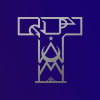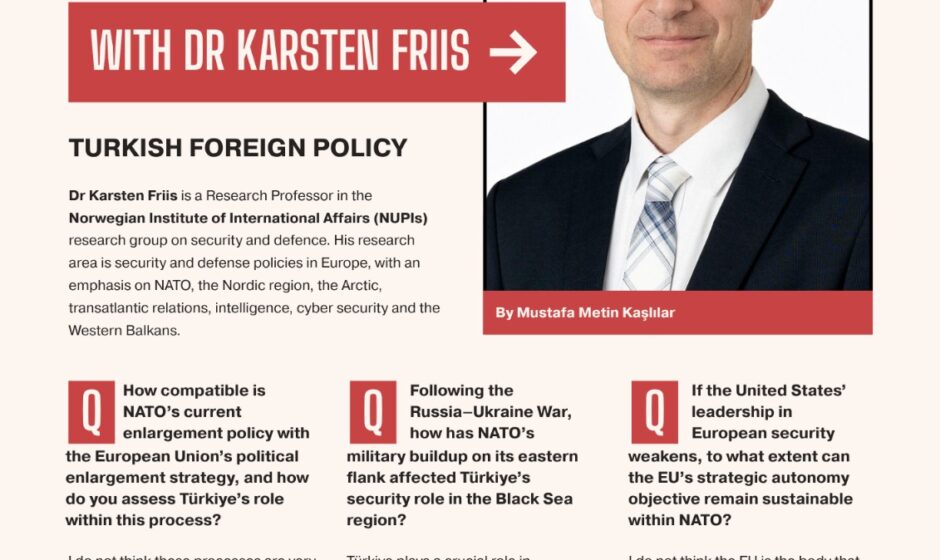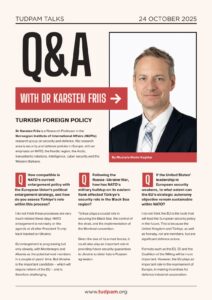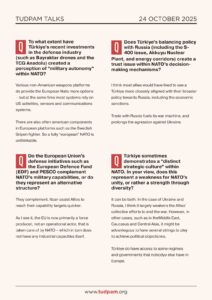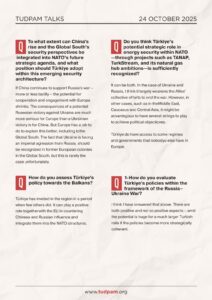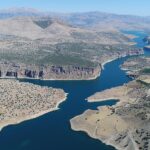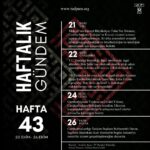Vice President of the Turkish Foreign Policy Research Center (TUDPAM) Mustafa Metin Kaşlılar conducted an interview with Dr. Karsten Friis, Research Professor at the Norwegian Institute of International Affairs (NUPI), in which they discussed NATO–Türkiye relations, the Russia–Ukraine War, the Balkans, and Türkiye’s role within the framework of the European Union.
The interview represents a significant contribution to understanding Türkiye’s position within the international security architecture.
Mustafa Metin Kaşlılar (M.M.K.): How compatible is NATO’s current enlargement policy with the European Union’s political enlargement strategy, and how do you assess Türkiye’s role within this process?
Dr. Karsten Friis (K.F.): I do not think these processes are very much related these days. NATO enlargement is not really on the agenda at all after President Trump bakctracked on Ukraine. EU enlargement is progressing but only slowely, with Montenegro and Albania as the potential next memebers in a couple of years’ time. But Ukraine is the important candidate – which will require reform of the EU – and is therefore challenging.
M.M.K.: Following the Russia–Ukraine War, how has NATO’s military buildup on its eastern flank affected Türkiye’s security role in the Black Sea region?
K.F.: Türkiye plays a crucial role in securing the Black Sea, the control of the strait, and the implementation of the Montreal convention. Given the sixe of its armed forces, it could also play an important role in providing future security guarantees to Ukraine to deter future Russian agression.
M.M.K.: If the United States’ leadership in European security weakens, to what extent can the EU’s strategic autonomy objective remain sustainable within NATO?
K.F.: I do not think the EU is the body that will lead the European security policy in the future. This is because the United Kingdom and Türkiye, as well as Norway, not are members, but are significant defence actors. Formats such as the E3, E5 and the Coallition of the Willing will be more important. However, the EU plays an important role in the rearmament of Europe, in making incentives for defence industrial cooperation.
M.M.K.: To what extent have Türkiye’s recent investments in the defense industry (such as Bayraktar drones and the TCG Anadolu) created a perception of “military autonomy” within NATO?
K.F.: Various non-American weapons platforms do provide the European Nato more options – but at the same time most systems rely on US sattelites, sensors and communications systems. There are also often american components in European platforms such as the Swedish Gripen fighter. So a fully “european” NATO is unthinkable.
M.M.K.: Does Türkiye’s balancing policy with Russia (including the S-400 issue, Akkuyu Nuclear Plant, and energy corridors) create a trust issue within NATO’s decision-making mechanisms?
K.F.: I think most allies would have liked to see a Türkiye more closesly alligned with their broader policy towards Russia, including the economic sanctions. Trade with Russia fuels its war machine, and prolongs the agression against Ukraine.
M.M.K.: Türkiye sometimes demonstrates a “distinct strategic culture” within NATO. In your view, does this represent a weakness for NATO’s unity, or rather a strength through diversity?
K.F.: It can be both. In the case of Ukraine and Russia, I think it largely weakens the Allies’ collective efforts to end the war. However, in other cases, such as in the Middle East, Caucasus and Central Asia, it might be advantegous to have several strings to play to achieve political objecticves. Türkiye do have access to some regimes and governments that nobodyu else have in Europe.
M.M.K.: Do the European Union’s defense initiatives such as the European Defence Fund (EDF) and PESCO complement NATO’s military capabilities, or do they represent an alternative structure?
K.F.: They complement. Itcan assist Allies to reach their capability targets quicker. As I see it, the EU is now primarily a force producer, not an operational actor, that is taken care of by NATO – which in turn does not have any industrial capacities itself.
M.M.K.: To what extent can China’s rise and the Global South’s security perspectives be integrated into NATO’s future strategic agenda, and what position should Türkiye adopt within this emerging security architecture?
K.F.: If China continues to support Russia’s war – more or less tacitly – the potential for cooperation and engagement with Europa shrinks. The consequences of a potential Ruswsian victory against Ukraina are much more serious for Europe than a Ukrainian victory is for China. But Europe has a job to do to explain this better, including tothe Global South. The fact that Ukraine is facing an imperial agression from Russia, should be recognized in former European colonies in the Global South, but this is rarely the case unfortunately.
M.M.K.: Do you think Türkiye’s potential strategic role in energy security within NATO—through projects such as TANAP, TurkStream, and its natural gas hub ambitions—is sufficiently recognized?
K.F.: Probably not. But Türkiye could also have played a much stronger role in NATO, if its policies weren’t that mixed. A firmer stand against Russia would, in my view, provided Türkiye with a potentially much stronger long-term position. The Putin regime will at some stage collapse, and then it is important to be on the right side of history. Ukraine and Türkiye could also be much stronger security partners than today.
M.M.K.: How do you assess Türkiye’s policy towards the Balkans?
K.F.: Tukey has inveted in the region in a period when few others did. It can play a positive role together with the EU in countering Chinese and Russian influence and integrate them into the NATO structures.
M.M.K.: How do you evaluate Türkiye’s policies within the framework of the Russia–Ukraine War?
K.F.: I think I have answered that above. There are both positive and not so positive aspects – amd the potential is huge for a much larger Turkish roile if the policies become more strategically coherent.

